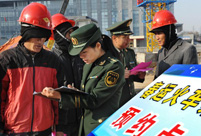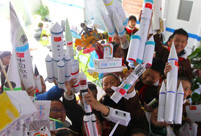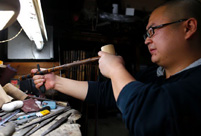 'Jin' named the word of the year by cross-strait netizens
'Jin' named the word of the year by cross-strait netizens Chinese scientific expedition goes to build new Antarctica station
Chinese scientific expedition goes to build new Antarctica station
 Chinese naval escort fleet conducts replenishment in Indian Ocean
Chinese naval escort fleet conducts replenishment in Indian Ocean 17th joint patrol of Mekong River to start
17th joint patrol of Mekong River to start China's moon rover, lander photograph each other
China's moon rover, lander photograph each other Teaming up against polluters
Teaming up against polluters
SHIJIAZHUANG, Dec. 24 -- Snack bar owner, Wu Guangxue, 38, owns an apartment in Hejian City, north China's Hebei Province where he lives with his two children and his parents.
Wu has been running his restaurant for 13 years, but the hukou(household registration) of all his family remains in his home village, Huangcun.
"If we give up our rural hukou, we will lose not only our farmland, courtyard, government subsidies and rural life for ever, but would also be giving up our right to participate in the economic and political affairs of our village and relationships which have grown up over generations," said Wu.
China has resolved to remove hukou restrictions completely in towns and small cities, while gradually easing restrictions in medium sized cities. Conditions for those who wish to settle in big cities will be made more "reasonable."
The rigid registration system splits China's 1.3 billion people into rural and non-rural and prevents tens of millions of migrant workers from accessing services.
More than two decades ago, some farmers tried every means they could to get urban hukou for their children, believing it would help them bid farewell to arduous agricultural work and find better jobs, but to no avail.
Now that the time has comes to reform hukou, nostalgic farmers are reluctant to become permanent urbanites for various reasons.
Though the standard of rural living can be low, living costs are also low. "I will not give up my identity as a farmer, because rural areas have benefited a lot from government policies these years," said Hui Xue, 24, ceramic tile seller in Qingxian County, Hebei. Newly married, Hui is from a village in Cangxian County and has been working in Qingxian for over five years, but has not bought an apartment there.
Jobs and apartments in cities plus farms and houses in the countryside are the realities of farmers' lives, according to Xu Zhiheng, Communist Party head of Qianli Village, Wuqiao County, Hebei.
For many migrants, the stability of rural interests are a haven from their unstable "real" lives in townships and cities.
"Several of my friends who work in cities just have a monthly income of about 1,000 yuan (163 U.S. dollars). It is impossible for them to settle there," said eatery owner Wu.
Urbanization of migrant workers should be the results of farmers' calm and rational choices. Some migrants are successful in cities while others are not, Wu added.
"Without stable jobs and relatively high incomes, to keep the rural hukou is a wise choice for farmers," said Wu.
Adapting to urban life is not always easy, especially for seniors, many of whom do not want to move to cities and live with their children, preferring to stay in villages despite loneliness.
Urban life makes some migrants lonely too, as they do not have many friends as they do in home villages, where they enjoy a relaxed life with neighbors.
"Urban life has indeed great charm, but the high willow trees in the village make us feel more secure," said Wu.
 People prepare for upcoming 'Chunyun'
People prepare for upcoming 'Chunyun'  Highlights of Beijing int'l luxury show
Highlights of Beijing int'l luxury show Record of Chinese expressions in 2013
Record of Chinese expressions in 2013 China's moon rover, lander photograph each other
China's moon rover, lander photograph each other 17th joint patrol of Mekong River to start
17th joint patrol of Mekong River to start Spring City Kunming witnesses snowfall
Spring City Kunming witnesses snowfall Heritage of Jinghu, arts of strings
Heritage of Jinghu, arts of strings Weekly Sports Photos
Weekly Sports Photos PLA elite units unveiled
PLA elite units unveiled  China's stealth fighters hold drill over plateau
China's stealth fighters hold drill over plateau Chinese navy hospital ship's mission
Chinese navy hospital ship's mission  "Free lunch" program initiated in NW China
"Free lunch" program initiated in NW China  Rime scenery in Mount Huangshan
Rime scenery in Mount Huangshan DPRK's Kaesong Industrial Complex
DPRK's Kaesong Industrial Complex 'Jin' named the word of the year
'Jin' named the word of the year Day|Week|Month